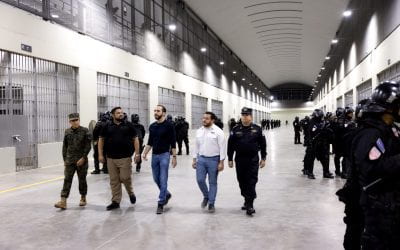Another Controversial World Cup to Remember
45 years later
Over the course of the 2022 FIFA World Cup, held last December in Qatar, one major theme dominated Western headlines—the human rights situation within the host country. Whether around its lack of rights for the LGBTQ+ community or its treatment of migrant workers who built the stadiums, much of the Western media focused on Qatar’s repeated transgressions. This sparked debates about the politicized nature of the sport that have continued long after the World Cup ended. Many are asking the question: should politics be kept out of soccer?

Courtesy of Arab Center Washington DC
Exactly 45 years ago, there was another World Cup in which politics and soccer were also inseparably intertwined—a World Cup in which allegations of shady match-fixing paved the host nation’s road to glory, a World Cup that took place in a country gripped by military dictatorship, brave protests and frequent disappearances: the 1978 World Cup in Argentina.
By the time the World Cup came to Argentina in 1978, the country was under a military dictatorship led by Lieutenant General Jorge Rafael Videla, who came to power in a coup two years earlier, a decade after Argentina had already won the hosting rights. The Videla regime brutally repressed its opponents, including communist sympathizers as well as students, trade unionists, journalists and anyone suspected of left-wing activities. The regime was responsible for the deaths of between 15,000 and 30,000 of its own citizens during what became known as the ‘Dirty War.’
Shockingly, much of this torture and murder took place right next to the El Monumental stadium, Argentina’s largest, where the 1978 tournament kicked off. Just a 10-minute walk away from this stadium was the Navy School of Mechanics, where 5,000 prisoners were held between 1976 and 1983. Only 150 of them survived. These prisoners could hear the roars of the crowd as Argentina progressed through the tournament, and many of them celebrated with as much passion as the military officers who tortured them, torn between pride in their country and hatred of the army regime that had taken it over.
At the same time, the tournament shone a global spotlight upon the situation in Argentina. Groups like Amnesty International raised awareness about the atrocities. Dissident movements such as the Mothers of the Plaza de Mayo also gained worldwide attention. The movement had started in 1977 with thirteen mothers in white headscarves protesting the disappearances of their children. By the time the World Cup started, hundreds of mothers were taking to the streets every week. Some players from Sweden’s national team even marched alongside them.
Despite the political violence and instability occurring in the background, on the pitch, Argentina passed through the first group stage without too much difficulty. In the second group stage—back then, there were two group stages followed by a final—they needed to beat Peru by a margin of three goals or more and score at least four goals to progress to the final instead of Brazil. This is where some accusations of foul play start to arise. According to the Sunday Times, in the lead-up to the game, the Argentine government shipped 35,000 tons of grain to Peru and the Central Bank of Argentina released US$50 million in frozen Peruvian assets. On top of this, General Videla visited the Peruvian dressing room ahead of the match, further adding to suspicions of foul play. Argentina defeated Peru 6-0 and went on to win the final against the Netherlands in extra time to lift the trophy, only years later did these details emerge.

Daniel Passarela holding the World Cup Trophy in 1978. Courtesy of Sky Sports
As Videla handed the famous World Cup trophy to the Argentinian team’s captain Daniel Passarella, he grinned, knowing that this soccer success had helped to somewhat cleanse Argentina’s image around the world. He perhaps also hoped that the pride and joy released within the country would help to prop up his regime and briefly override political grumblings. Argentina would temporarily rejoice, while the disappearances and oppression of the regime would rumble on. Indeed, Argentine goalkeeper Ubaldo Fillol brushed off any links to the regime. “To many people, the World Cup in 1978 means 30,000 disappeared,” Fillol said. “But none of us tortured or killed anyone. We just helped the country to have a little bit of joy and we defended the Argentine colors with bravery. I cannot be ashamed of that.”
John Moretti is a student at St. Paul’s school in London. Based in London with Greek and Italian-American heritage, he enjoys writing stories from across different cultures in areas including history, food and sport.
Related Articles
Haiti: A Gangster’s Paradise
Haiti is in the news. In recent weeks, gangs have coordinated violent actions, taken to the streets and liberated thousands of inmates to spread chaos and solidify their control of the Port-au-Prince capital.
Crime and Punishment in the Americas
As 2024 ushered in, newly-elected Ecuadorian President Daniel Noboa issued a state of emergency in his country, citing a wave of gang violence spurred by the prison escape of a local criminal leader with ties to Mexico’s ruthless Sinaloa Cartel.
Women CEOs in Latin America: Overcoming obstacles, navigating through challenges
I first arrived in Latin America in 1997, and since then, I’ve been involved in education and the development of leadership and governance issues in the region. During these 27 years—12 of them from Spain—I have had the opportunity to interact with leaders from the region, the private and public sectors, multinationals and small and medium-sized enterprises, and various industries.




